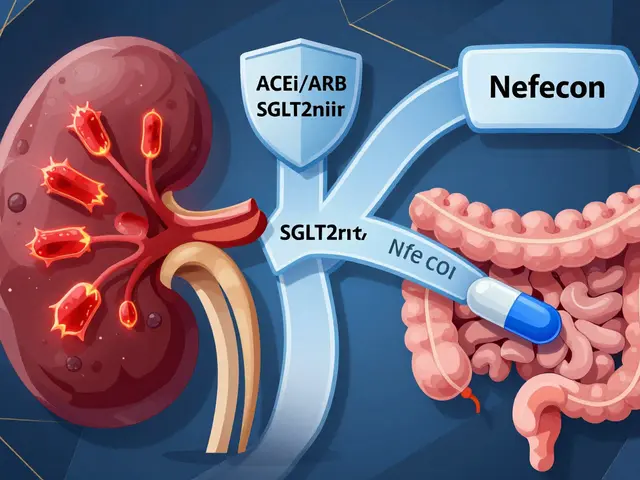When it comes to medications that help people manage alcoholism, Disulfiram is often a name that comes up. It's known for making the body react unpleasantly to alcohol, discouraging consumption. But like any medication, there's more to it than just its intended use. One crucial area that often gets less attention is its effect on the brain and cognitive functions.
Understanding how Disulfiram interacts with the brain is essential for both medical professionals and individuals considering its use. While the primary goal is to curb alcohol intake, the medication does come with a range of cognitive implications. Learning about these effects can help users and healthcare providers make informed decisions and take necessary precautions.
This article dives deep into what Disulfiram is, how it impacts the brain, the cognitive changes it can bring about, and offers some practical tips for managing these effects. Whether you're on the medication yourself or know someone who is, this exploration aims to provide valuable insights for better understanding and managing the cognitive aspects of Disulfiram.
- What is Disulfiram?
- How Disulfiram Impacts the Brain
- Cognitive Changes and Side Effects
- Research and Studies
- Practical Tips and Advice
What is Disulfiram?
Disulfiram is a medication that is primarily used to support the treatment of chronic alcoholism by producing an acute sensitivity to ethanol (drinking alcohol). When a person consumes even a small amount of alcohol after taking Disulfiram, they experience a severe and unpleasant reaction. This reaction includes symptoms such as nausea, vomiting, headache, and palpitations, which are designed to deter the individual from drinking.
The medication was first discovered in the 1920s, but it wasn’t until the 1940s that its potential as a treatment for alcohol dependency was realized. Physicians typically prescribe Disulfiram under the brand name Antabuse. The chemical works by inhibiting the enzyme acetaldehyde dehydrogenase, which plays a crucial role in metabolizing alcohol. When this enzyme is blocked, acetaldehyde builds up in the blood, causing the adverse reactions.
The decision to use Disulfiram often comes after a series of evaluations and discussions between the patient and healthcare provider. It’s generally recommended for those who have already undergone detoxification and are committed to maintaining sobriety. Though effective at discouraging alcohol intake, it's not a standalone treatment. It's usually coupled with counseling or other forms of therapy for comprehensive care.
Disulfiram isn't free of controversies. Some argue about the ethics of using a drug that causes discomfort as a preventive measure. However, many in the medical community, including Dr. Nora Volkow, director of the National Institute on Drug Abuse, believe its benefits outweigh the risks.
“For individuals who are highly motivated to stop drinking, Disulfiram can be a powerful tool in the arsenal against alcoholism,” she notes.
It's also worth noting that Disulfiram's usefulness isn't limited to treating alcoholism. Recent studies have explored its potential in treating certain psychiatric and neurological disorders. For instance, there is ongoing research into its impacts on conditions like cocaine dependence because of its ability to inhibit dopamine beta-hydroxylase.
The medication is generally taken in tablet form, with the dosage varying depending on the individual’s condition and response to the drug. It’s crucial for patients to read and understand the guidelines provided by their doctors and pharmacists. Missing a dose or consuming alcohol while on the medication can lead to immediate and severe consequences.
Given that Disulfiram stays in the system for a while, even after stopping the medication, it’s essential to continue abstaining from alcohol for some time post-treatment. This lingering effect underscores the significance of a comprehensive treatment plan that includes continuous support from healthcare providers, family, and peer support groups.
While the journey to sobriety is undoubtedly challenging, Disulfiram has stood the test of time as a component of effective treatment regimes. It offers hope to many people struggling with alcoholism, providing a tangible deterrent in their daily battle against addiction.
How Disulfiram Impacts the Brain
Disulfiram is a medication commonly used to help people with alcohol use disorder by triggering unpleasant effects when alcohol is consumed. But how exactly does it affect the brain? This question is essential to understanding the broader impacts of this medication on cognitive function and brain chemistry. To start with, Disulfiram inhibits an enzyme called aldehyde dehydrogenase. This enzyme is responsible for breaking down acetaldehyde, a toxic byproduct of alcohol metabolism. When Disulfiram is present, acetaldehyde accumulates, leading to symptoms like nausea, headache, and a general feeling of being unwell.
One of the more intriguing aspects of Disulfiram's effect on the brain involves its influence on neurotransmitter systems. *Neurotransmitters* are chemicals that transmit signals across a synapse from one neuron to another. Significant among these is dopamine, often referred to as the 'feel-good' neurotransmitter. Studies show that Disulfiram can increase dopamine levels by inhibiting the enzyme dopamine beta-hydroxylase. This might explain why some people experience heightened emotions or even changes in mood while taking Disulfiram.
Aside from neurotransmitter impact, there's growing research on how Disulfiram might affect the brain's structural aspects. Preliminary evidence suggests that it could change the brain's plasticity—the brain's ability to adapt and reorganize itself. This makes understanding Disulfiram vital, especially for long-term users. Interestingly, some studies indicate that Disulfiram could even play a role in managing other conditions like cocaine dependence. According to Dr. David J. Nutt, a renowned neuropsychopharmacologist,
"The enzyme-inhibiting properties of Disulfiram offer groundbreaking potential for treating various addiction-related disorders."
While all these effects may sound intriguing, they also come with a set of cognitive challenges. For instance, some users have reported episodes of confusion, memory issues, or even mild cognitive impairment. Such effects are often subtle and can be reversible upon discontinuing the medication. Therefore, medical professionals usually recommend close monitoring, especially in the initial stages of treatment. Users should also be aware of potential interactions between Disulfiram and other medications or substances. It's crucial to discuss these factors with healthcare providers to mitigate any adverse cognitive effects. For instance, combining Disulfiram with certain antidepressants can amplify both drugs' side effects, leading to more pronounced cognitive disturbances.
In summary, the impact of Disulfiram on the brain is multi-faceted, involving various neurotransmitter systems, enzymes, and possibly even the brain's structural properties. This depth of action provides a compelling reason for its effectiveness but also necessitates caution. Understanding these mechanisms can help users and healthcare providers better navigate the challenges and benefits that come with Disulfiram. By staying informed and vigilant, one can manage the cognitive impact while leveraging the medication's benefits. It's always recommended to seek professional advice tailored to individual needs, as everyone's response to the medication can differ significantly.

Cognitive Changes and Side Effects
Disulfiram primarily serves as a deterrent for alcohol consumption, but its effects on the brain go beyond that. One crucial aspect is how it impacts cognitive functions, which involves a range of mental activities such as thinking, reasoning, remembering, and learning. People on Disulfiram often report varying cognitive changes, which are essential to understand for effective management.
A prominent cognitive effect of Disulfiram is on memory. Some users experience challenges in both short-term and long-term memory retention. This might be particularly concerning for people who require a sharp memory for their daily tasks. The reasons behind these memory issues could be linked to how Disulfiram interacts with brain chemistry, specifically neurotransmitter levels. Changes in neurotransmitters like dopamine and serotonin can affect how well the brain processes and stores new information.
"Disulfiram can cause significant cognitive changes, and it's crucial for users to be aware of these potential side effects," says Dr. Michael Johnson, a neurologist specializing in substance abuse treatment. "Managing expectations and monitoring mental functions can help mitigate any negative impacts."
Attention span and focus are other cognitive areas that might be influenced. Some individuals report difficulties in maintaining focus on tasks, which can be disruptive in both personal and professional settings. This can be attributed to the brain's reaction to the chemical changes induced by Disulfiram. It’s essential to monitor any degradation in focus and consult healthcare providers if these issues become persistent.
Disulfiram might also affect mood and emotional regulation. Users sometimes report mood swings, irritability, and bouts of anxiety. Understanding that these cognitive changes can be directly linked to the medication helps in addressing and managing them effectively. Emotional regulation is closely tied to cognitive functions, and any alterations in this area could impact decision-making and social interactions.
Headaches and dizziness are also frequently reported side effects, and they can indirectly affect cognitive functions. For instance, consistent headaches can make concentrating difficult, impacting productivity and cognitive performance. Similarly, dizziness can interfere with spatial awareness and balance, which are essential for performing daily tasks effectively and safely.
An interesting aspect people often overlook is how Disulfiram affects sleep patterns. Quality sleep is crucial for optimal cognitive functioning. Disrupted sleep can lead to issues with memory, attention, and other cognitive functions. Therefore, it's important to pay attention to sleep patterns while on Disulfiram and seek guidance from healthcare professionals to manage sleep-related issues.
Lastly, understanding and accepting these cognitive side effects is the first step toward managing them. Simple strategies like mindfulness, regular exercise, and cognitive therapy can help counteract some of the negative effects. It’s also beneficial to keep a personal journal to document any changes in cognitive functions, which can be discussed with healthcare providers for better individualized treatment plans.
Research and Studies
In the realm of academia and medical research, understanding how Disulfiram affects cognitive function is a topic that has attracted significant attention. Several studies have delved into the various impacts this medication has on the brain, providing a broader view of its side effects and benefits. One of the primary areas of focus is its influence on brain chemistry and how this translates into changes in cognitive abilities.
In a 2018 study published in the Journal of Psychopharmacology, researchers observed that Disulfiram might lead to alterations in neurotransmitter levels. They found that this medication significantly affects dopamine levels, the neurotransmitter closely tied to pleasure and reward systems in the brain.

Practical Tips and Advice
Disulfiram, while primarily intended to help people abstain from alcohol, can have some notable effects on cognitive function. It's essential to be aware of ways to manage and mitigate these effects effectively. Here are some practical tips and advice for those taking Disulfiram.
1. Monitor Mental Health Closely
Regularly keeping an eye on mental health is critical for anyone taking Disulfiram. Changes in mood, memory lapses, or difficulty concentrating can sometimes occur. If you notice any unusual changes, it's important to communicate these with your healthcare provider. They can help adjust dosages or provide strategies to cope with these alterations.2. Cognitive Exercises
Engaging in brain-stimulating activities can help maintain cognitive function. Puzzles, reading, or even learning new skills can keep your brain active. The emphasis should be on consistency, so try to set aside time each day for these activities. This approach helps counterbalance any potential negative effects on cognitive performance.3. Maintain a Healthy Lifestyle
Living a balanced lifestyle, including a diet rich in nutrients, regular physical activity, and sufficient sleep, can significantly enhance overall brain health. Foods rich in antioxidants, omega-3 fatty acids, and vitamins are particularly beneficial. Healthy habits can mitigate some cognitive side effects by supporting the body's natural functions.4. Social Support
Having a strong support system is crucial when taking medications like Disulfiram. Family, friends, or support groups can provide emotional and psychological backing, which is beneficial for managing cognitive changes. Knowing that you have a safety net can reduce stress and improve mental well-being.5. Regular Check-ups
Frequent visits to your healthcare provider are essential. Regular blood tests and cognitive assessments will help monitor the medication's effects on your body and brain. Early detection of any adverse changes allows for prompt intervention."Disulfiram can be an effective medication for alcohol dependency, but it's crucial to be vigilant about mental and cognitive health while on this treatment," says Dr. John Morgan, a renowned addiction specialist.
6. Hydration and Hydration
Staying hydrated is vital, as it helps the body and mind function more efficiently. Drinking plenty of water can aid in reducing some side effects and keep you feeling your best while on Disulfiram.7. Personalized Plan
Work with your healthcare provider to develop a plan tailored to your specific needs. This plan can include dietary recommendations, exercise routines, mental health strategies, and more. Personalized plans are more effective and easier to follow because they are designed with your individual requirements in mind.By adhering to these practical tips, those taking Disulfiram can better manage its cognitive effects and lead a healthier, more balanced life. Remember, always consult your healthcare provider before making any significant changes to your routine.






Ah sure, as an Irish lad I’ve seen plenty of folks on Disulfiram, and the memory hiccups can feel like a leaky faucet in your head.
September 20Patrick Fortunato